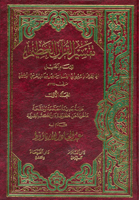About the Book

 The Tafsir (or exegessis on the Qur’an) by Ismail Ibn Kathir (1301-1373) is one of the most mainstream and widely-accepted of Islamic texts. It is a detailed commentary on each verse and sura of the Qur’an and, in English translation, runs to 10 volumes (approximately 6,500 pages).
The Tafsir (or exegessis on the Qur’an) by Ismail Ibn Kathir (1301-1373) is one of the most mainstream and widely-accepted of Islamic texts. It is a detailed commentary on each verse and sura of the Qur’an and, in English translation, runs to 10 volumes (approximately 6,500 pages).
According to Wikipedia, the Tafsir Ibn Kathir, “linked certain Hadith, or sayings of Muhammad, and sayings of the sahaba to verses of the Qur’an, in explanation. Tafsir ibn Kathir is famous all over the Muslim world, and among Muslims in the Western world is one of the most widely used explanations of the Qu’ran today.”
In its advertisement for the print version of Tafsir Ibn Kathir, its US-based publishing house, Dar-us-Salam, confirms the authority of the text:
Since the Qur’an is the primary source of Islamic teachings, the correct understanding for the Qur’an is necessary for every Muslim. The Tafsir of Ibn Kathir is the most renowned and accepted explanation of the Qur’an in the entire world. In it one finds the best presentation of Ahadith, history, and scholarly commentary.
![]()
Availability
Like the other texts assessed by the Mapping Shariah Project, the Tafsir Ibn Kathir is readily available in print or online. Both the English and Arabic versions– as 10-volume sets– are published in the United States by Dar-us-Salam. They are available as a boxed-set, or individually. Several online merchants sell the books on Amazon.com as well. MSA Publication Limited has a new version (labelled 2nd Edition) in the United Kingdom, supervised by Muhammad Saed Abdul-Rahman.
Because of the size of the complete set, it is unlikely to be sold in the average mosque bookstore. However, it would be commonplace to find volumes from the set, or the complete set, inside a mosque or residence alongside Islamic reference books.
An English-language interactive version is online, notably at Tafsir.com and Qtasfir.com. In this setting, the reader selects a surah from a drop-down menu and proceeds through explanation of each Qur’anic verse. A similar HTML-only version is at Abdurrahman.org.
![]()
Relevant Quotes
As “the most renowned and accepted explanation of the Qur’an in the entire world,” the actual contents of the Tasfir Ibn Kathir are crucial; more than any other text, it shapes Muslims’ understanding of their most important book.
![]()
On jihad:
- In this Ayah, Allah made it obligatory for the Muslims to fight in Jihad against the evil of the enemy who transgress against Islam. Vol. 1, P. 596; Sura 2:126–Al Baqarah
- Therefore, the believers fight in obedience to Allah and to gain His pleasure, while the disbelievers fight in obedience to Shaytan [Satan]. Allah then encourages the believers to fight His enemies, (So, fight against the friends of Shaytan; even feeble indeed is the plot of Shaytan). Vol. 2, P. 516; Sura 4:76–An Nisa
- Rather, you will earn your full rewards for them [your good deeds]. This promise directs the focus of believers [Muslims] away from this life and makes them eager for the Hereafter, all the while encouraging them to fight in Jihad. Vol. 2, P. 519; Sura 4:77–An Nisa
- …He [Allah] commanded them [Muslims] to fight against their enemies, the disbelievers and idolators who have deviated from the straight path and abandoned the correct religion. Vol. 3, P. 170; Sura 5:35–Al Ma-idah
- In the beginning of Islam, Muslims were ordered to observe patience in the face of oppression of the idolators and the People of the Scriptures so that their hearts may incline towards Islam. However, when the disbelievers persisted in stubbornness, Allah legislated for the believers to fight in Jihad. Vol. 9, P. 23-24; Sura 45:14–Al-Jathiyah
![]()
on women:
- Allah’s statement, (beat them [wives]) means, if advice and ignoring her in bed do not produce the desired results, you are allowed to discipline them, without severe beating. …you are allowed to discipline them lightly. Vol. 2, P. 445-446; Sura 4:34–An Nisa
![]()
On Non-Muslims:
- I [Muhammad] was commanded to fight against the people until they proclaim, “There is no deity worthy of worship except Allah.” Vol. 4, P. 315; Sura 8:39–Al-Anfal
- Upon the end of the four months during which We prohibited you from fighting the idolators, and which is the grace period We gave them, then fight and kill the idolators wherever you may find them. Vol. 4, P. 376; Sura 9:5–At-Tawbah
- …[D]o not wait until you find them [idolators]. Rather, seek and besiege them in their areas and forts, gather intelligence about them in the various roads and fairways so that what is made wide looks ever smaller to them. This way, they will have no choice, but to die or embrace Islam[.] Vol. 4, P. 376; Sura 9:5–At-Tawbah
- Allah the Exalted encourages the believers [Muslims] to fight against the polytheists, disbelieving Jews and Christians, who uttered this terrible statement and utter lies against Allah, the Exalted. Vol. 4, P. 408; Sura 9:30-31–At-Tawbah
- Allah commanded the Prophet to fight the disbelievers with the sword, to strive against the hypocrites with the tongue and annulled lenient treatment of them. Vol. 4, P. 475; Sura 9:73–At-Tawbah
- Perform Jihad against the disbelievers with the sword and be harsh with the hypocrites with words, and this is the Jihad performed against them. Vol. 4, P. 475; Sura 9:73–At-Tawbah
- Allah commands the believers [Muslims] to fight the disbelievers, the closest in area to the Islamic state, then the farthest. Vol. 4, P. 546; Sura 9:123–At-Tawbah
- …fight the disbelievers and trust in Allah knowing that Allah is with you if you fear and obey Him. Vol. 4, P. 548; Sura 9:123–At-Tawbah
- (So, when you meet those who disbelieve (in battle), smite their necks) which means, ‘when you fight against them [disbelievers], cut them down totally with your swords.” ([U]ntil you have fully defeated them,) meaning, ‘you have killed and utterly destroyed them.’ Vol. 9, P. 87; Sura 47:4–Muhammad
- He [Allah] has ordered Jihad and fighting against the enemies in order to try you and test your affairs. Vol. 9, P. 89; Sura 47:4–Muhammad
- Allah the Exalted orders His Messenger to perform Jihad against the disbelievers and hypocrites, the former with weapons and armaments and the later by establishing Allah’s legislated penal code[.] Vol. 10, P. 72; Sura 66:9–At-Tarhim
- In the beginning of Islam, Muslims were ordered to observe patience in the face of oppression of the idolators and the People of the Scriptures so that their hearts may incline towards Islam. However, when the disbelievers persisted in stubbornness, Allah legislated for the believers to fight in Jihad. Vol. 9, P. 23-24; Sura 45:14–Al-Jathiyah


